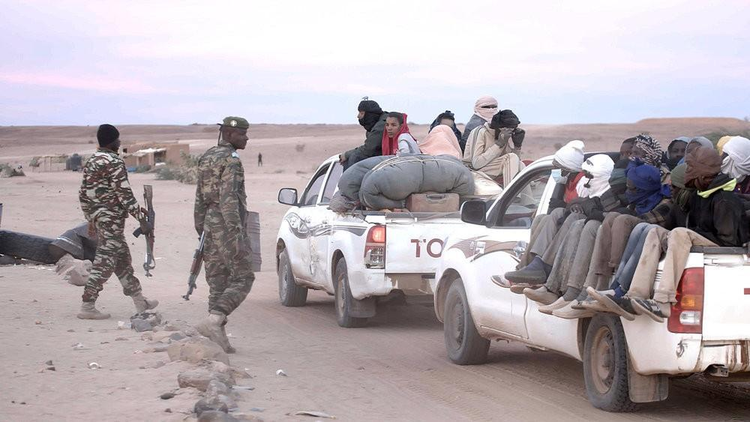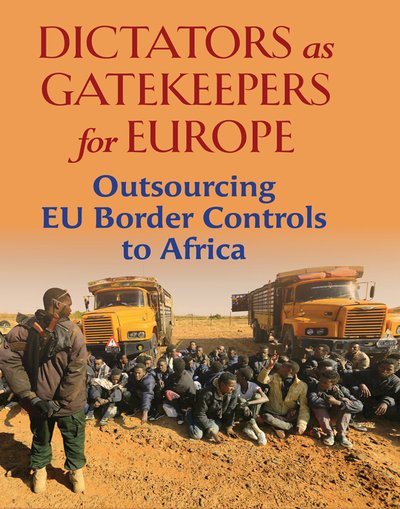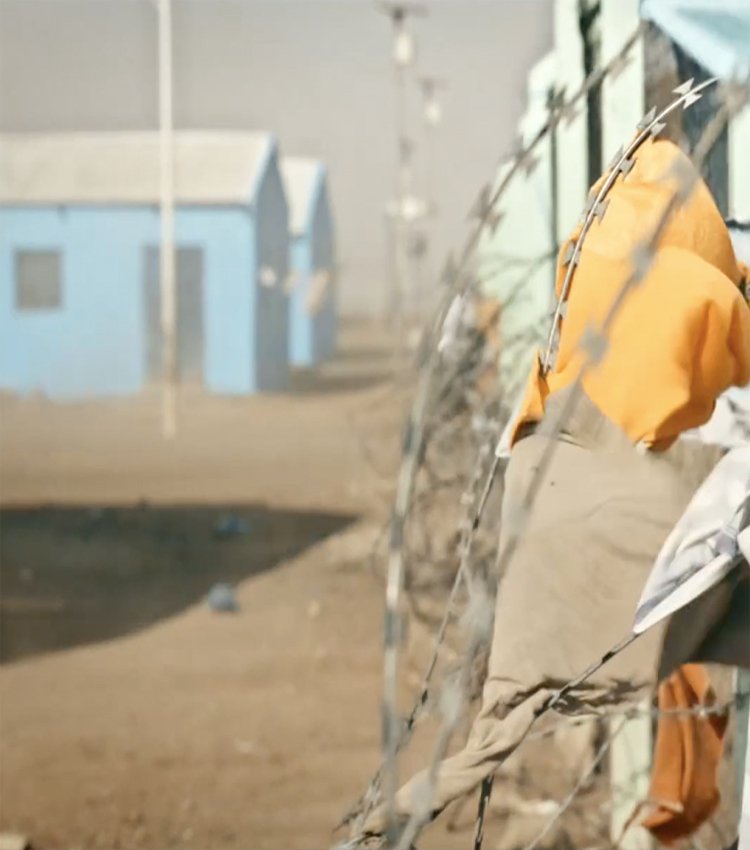What is Externalization? 5 Questions
Published March 15th, 2020 - written by: migration-control.info

(C) Thomas Schneider
1. Where do EU funds spent on “development” in Africa go?
The EU increasingly conditions development projects by migration control. The money goes primarily to states with migration hubs such as Mali, Niger and Sudan. Apart from these, these funds go to states with which the EU has already concluded deportation or readmission agreements or where it considers a conclusion to be promising.
After 2015, in addition to existing development aid funds from the European Development Fund (EDF), EU has set up a so-called emergency instrument of 4 billion euros, the European Trust Fund (EUTF). Within the framework of the EU budget negotiations ([simple_tooltip content='EU budget for the years 2021 - 2027, which is currently under negotiation. In the new MFF, the Development Fund will disappear and be incorporated into the "Foreign Policy Instrument" for "Neighbourhood, Development and International Cooperation" (NDICI), which will be endowed with up to €93 billion, one-tenth of which will be for migration management. Further billions of euros for the defence of migratory populations are found in funds called IBMF, AMF, ISF. Detailed material on the EU budget from 2021 onwards'for the years 2021 - 2027, new funds of more than 30 billion euros are currently being negotiated. It is planned to double spending on ""migration management" and quadruple spending on border upgrading. These funds will mainly be used to stop migration to Europe already on the African continent as effectively as possible by obliging governments to cooperate in migration control ̶ for example by expanding border management, but also by strengthening the justice and security apparatus against "smugglers" and "human traffickers". The money flows primarily to states with migration hubs such as Mali, Niger and Sudan or to states with which the EU has already concluded deportation or readmission agreements or where it considers a new agreement to be promising, such as the populous states of Nigeria and Ethiopia. From the outset, the aim was to implement such agreements as soon as possible, to satisfy European electorates with a high number of deportations and to strengthen transnational networks for migration control. On this page we will show in detail which programmes in which countries EU is supporting, with the sole aim of preventing or reversing migration.
2. What about development, democracy and human rights?
The basic goals of development cooperation, "good governance”, low corruption, and economic development, have been sidelined. In the first place, the willingness of the state to play gatekeeper for the EU now comes first.

The basic goals of development cooperation – „good governance“, low corruption, and economic development – have been sidelined. In the first place, the willingness of the state to play gatekeeper for the EU now comes first. To this end, EU cooperates with dictators, authoritarian regimes and militia leaders. One example is the RSF militias in Sudan, which are responsible for the genocide in Darfur and are now deployed as border guards. Another example is EU’s cooperation with the so-called Libyan Coast Guard. These are militias that first send migrants and refugees out to sea in unseaworthy rubber dinghies, only to „rescue“ them and then deport them to sites which resemble concentration camps. A further example is EU’s collaboration with the Egyptian military dictator El Sissi. EU has promised El Sissi billions of euros, despite him having put thousands of political opponents and activists behind bars to silence them.
EU also aims to minimize burocratic obstacles to the deportation of migrants to Africa. EU development funds are therefore not primarily concerned with supporting or creating opportunities for the local population, but with controlling migration at all costs.
On this page we show in detail how regimes, dictators, generals and corrupt presidents enrich themselves on EU funds and thus maintain their power, while people are denied their human rights and opportunities for a better life.
3. What would really benefit the people in Africa?
The major question is whether so-called “development aid” really helps people in Africa or whether it rather serves the interest of those in power , of transnational corporations wanting to exploit raw materials and of the members of a small upper class.
The major question is whether so-called „development aid“ really helps people in Africa or whether it rather serves the interest of those in power , of transnational corporations wanting to exploit raw materials and of the members of a small upper class. The direct remittances sent by migrants promote the local economy in poor countries more than development aid. The money reaches families and small family businesses unobstructed, ensuring the survival of thousands of people.
The EU has often promised to create „legal channels“ for migration to Europe, as well as the „resettlement“ of people from refugee camps. Instead, it has been closing the few remaining routes and possibilities to migrate.
However, the aging European population may soon need migration of young people from Africa. Already now, many industrial sectors depend on migrant workers. The main reasons for opposing migration are racist stereotypes dating back to colonial history and a preventive fear of further strengthening right-wing forces in Europe. However, many studies have shown that the European population is in fact open to newcomers from Asia and Africa.
And even if there were racist majorities, as perhaps in Saxony, Poland or Hungary, politicians would have the responsibility to educate rather than serve and reinforce prejudices, for example by renaming the EU Commission’s Department for Migration as „Protecting our European Way of Life“.
We show on this page that cross-border mobility within Africa and from Africa to Europe cannot be prevented in the global era. Freedom of movement for all benefits all if it takes place in solidarity and democracy.
4. Who benefits from armament and border control?
In order to close the routes to Europe, inner-African borders are being technologically upgraded and African border guards are being trained. European manufacturers of security technology (mainly arms companies) receive contracts worth billions.

In order to close the routes to Europe, inner-African borders are being technologically upgraded and African border guards are being trained. European manufacturers of security technology (mainly arms companies) receive contracts worth billions. At the same time, transnational corporations and consortiums do not simply respond to the political demand, they create it through various lobby groups and advisory bodies.
Various actors promotearmament in the Sahara and Sahel region. The legitimization is often linked to geopolitical interests and the co-called „war on terror“. However, armament and training are at the same time being used and designed to control migration. European military missions, for example, have had their mandates in the area of migration extended since 2015. In the meantime, there are increasing warnings that Europe is becoming a warring party in the Sahel and Sahara itself, as it is in Afghanistan.
The expansion of biometric identification documents and databases, surveillance systems and the supply of weapons and military vehicles to African security agencies are turning Africa into a sales market for European technology. Governments are supplied with cost-intensive high technologies that they can use to monitor the population and maintain power. The training of African border guards is carried out with the help of European trainers.
This page shows that the population does not benefit from the European funds chanalled to Africa. Instead, these funds benefit authoritarian regimes and arms and surveillance technologies companies.
5. Who are the losers?
Today’s demarcation of African states is the legacy of colonialism. The lines drawn based on European economic and power interests intersect the migration areas of nomadic and pastoralist populations and ethnic kinships. Militarized enforcement of borders threatens local economies and trade routes.

(C) Thomas Schneider
Today’s demarcation of African states is the legacy of colonialism. The lines drawn based on European economic and power interests intersect the migration areas of nomadic and pastoralist populations and ethnic kinships. Militarized enforcement of borders threatens local economies and trade routes. Seasonal migration becomes „international“ migration. In many cases, European border management projects lead to the cutting of traditional migration routes, because intra-African migration is a assumed to be nothing but a first step on the road to Europe.
The regional communities of states in East and West Africa, which were founded on the model of the EU, have included the free movement of labour and goods in their programme and want to introduce common passports. Integration instead of regulation holds development potential for the entire continent. On the one hand, the EU finances the African Union; on the other hand, it destroys integration processes by militarizing inner-African borders. While it promotes joint military and police units (especially the „G5 Sahel„) and trains them, crosssing borders legally is increasingly difficult, expensive, and dangerous for civilians. The EU’s approach is: Schengen for the EU, border controls for Africa. Many areas, especially in the Sahara, have become areas under military siege in the years since 2015.
This page shows that open borders for Europeans go hand in hand with militarized border controls in Africa. However, expansion and omnipresence of surveillance techniques affect all.